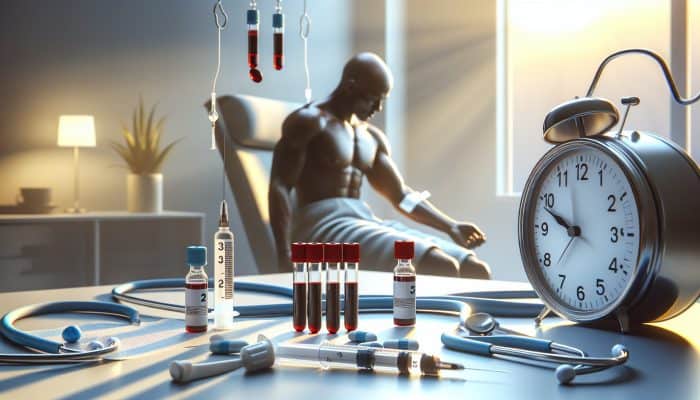Explore the Essential Benefits of a Testosterone Blood Test for Effective Health Management
What Are the Key Measurements Taken in a Testosterone Blood Test?

The Testosterone Blood Test in Oldham serves as a vital diagnostic tool that accurately assesses the levels of testosterone present in your blood. This hormone plays a crucial role in influencing numerous physiological functions, including muscle growth, mood regulation, and energy production. Maintaining optimal testosterone levels is essential for overall health and well-being. Any significant fluctuations or deviations from the healthy testosterone range may signal underlying health problems. This makes the test indispensable for diagnosing various conditions, such as Hypogonadism, infertility, and mental health disorders, including depression and anxiety. The test specifically evaluates critical health issues, such as:
- Hypogonadism – Insufficient testosterone production
- Infertility – Challenges in achieving pregnancy
- Bone density reduction – Increased susceptibility to fractures
- Depression and anxiety disorders – Impact on mental well-being
- Sexual dysfunction – Problems with sexual performance
- Metabolic syndrome – A cluster of conditions elevating heart disease risk
- Muscle mass decline – Decrease in muscle strength and size
Identifying these medical conditions is crucial, as they can greatly affect an individual’s quality of life and overall health status.
 How is the Testosterone Blood Test Conducted?
How is the Testosterone Blood Test Conducted?
The process for carrying out a testosterone blood test is quite uncomplicated and involves obtaining a small blood sample from a vein, typically found in the arm. This efficient procedure is executed within a clinical environment by a trained healthcare professional. A sterile needle is used to collect the blood sample, which is then forwarded to a laboratory for thorough analysis. Generally, the entire process lasts only a few minutes, but it is imperative that the testing environment adheres to stringent hygiene standards to prevent any contamination that could potentially compromise the accuracy of the test results.
Who Should Seriously Consider Undergoing Testosterone Testing?
Men aged 40 and over, along with those displaying signs of low testosterone, should strongly consider getting tested. Symptoms that may warrant such testing include persistent fatigue, a noticeable decline in libido, erratic mood fluctuations, and a significant reduction in muscle mass. Furthermore, individuals with a family history of hormone-related disorders or those currently undergoing treatments known to affect hormone levels should also seek testing as a precautionary measure. Identifying testosterone imbalances early can facilitate timely interventions and treatment, greatly enhancing overall health outcomes.
When Is the Optimal Time to Conduct a Testosterone Blood Test?

It is generally recommended to perform testosterone testing in the morning, as testosterone levels are typically at their peak during this time. Morning tests yield more reliable results due to the natural fluctuations in testosterone throughout the day. Ideally, individuals should undergo testosterone evaluations more than once to accommodate these daily variations. If initial tests reveal abnormal testosterone levels, your healthcare provider may suggest retesting under varying conditions or at different times to confirm results and ensure accurate diagnostic conclusions.
What Insights Can You Gain from Your Testosterone Test Results?
Your testosterone blood test results will inform you whether your testosterone levels fall within the normal range, are low, or elevated. For adult males, the typical testosterone levels usually range from 300 to 1,000 ng/dL; however, these ranges may vary based on age and overall health. If the results indicate low testosterone, your healthcare provider may investigate potential underlying causes and recommend further medical evaluations or treatment options. On the other hand, if your levels appear elevated, this may necessitate additional testing to uncover any underlying health issues, ensuring a thorough and comprehensive approach to your healthcare.
Revealing the Health Benefits Associated with Testosterone Testing in Oldham
What Health Advantages Come with Maintaining Normal Testosterone Levels?

Maintaining normal testosterone levels is paramount for achieving optimal health and well-being. Adequate testosterone levels are linked to improved mood, heightened energy levels, and increased muscle mass and strength. Furthermore, additional health benefits associated with balanced testosterone levels include:
- Enhanced bone density – Stronger bones and a lower risk of fractures
- Improved cognitive function – Enhanced memory and focus
- Better cardiovascular health – Reduced risk of heart disease
- Increased libido and sexual function – Heightened sexual desire and performance
- Better fat distribution – Healthier body composition
- Stronger immune response – Enhanced defense against illnesses
These benefits underscore the significance of regular testosterone testing, particularly for men in Oldham and surrounding areas, empowering individuals to stay informed about their health status and take proactive steps to maintain their well-being.
How Can Understanding Your Testosterone Levels Transform Your Life?
Gaining insight into your testosterone levels can empower you to make informed lifestyle changes or seek appropriate medical interventions that enhance your overall well-being. For instance, if a testosterone deficiency is identified, healthcare providers may recommend tailored interventions such as hormone replacement therapy or lifestyle modifications, including dietary improvements and increased physical activity. Many men report significant enhancements in mood, energy, and quality of life after addressing low testosterone levels. Regular testing allows individuals to take control of their health, leading to substantial improvements in both physical and mental well-being.
Can Testosterone Testing Aid in Medical Diagnoses?
Absolutely, testosterone testing is an invaluable diagnostic instrument for identifying conditions such as hypogonadism and infertility, both of which can severely impact an individual’s health and quality of life. Early diagnosis through blood testing facilitates timely interventions, which are essential for effectively managing these conditions. For example, recognizing low testosterone can prompt exploration of various treatment options, including lifestyle changes and medical therapies, ultimately improving health outcomes and restoring hormonal balance.
Insights from Experts on Testosterone Blood Testing in Oldham
What Recommendations Do Experts Have for Maintaining Optimal Testosterone Levels?
Healthcare professionals stress the importance of maintaining optimal testosterone levels for men's health. Imbalances in testosterone can lead to a myriad of health problems, including reduced energy levels, increased body fat, and symptoms of depression. Real-world experiences show that numerous men have experienced significant improvements in their physical and mental health after receiving treatment for low testosterone. Growing awareness about the essential role testosterone plays in health has encouraged more men in Oldham to pursue testing and treatment, fostering a proactive approach to health management.
How Should You Interpret Your Test Results?
Interpreting your test results requires comparing them against established normal ranges, which may necessitate consultation with a healthcare provider for a clearer understanding. Recognising whether your testosterone levels are within normal parameters or indicative of a medical issue is essential. A qualified healthcare professional will interpret the results, taking factors such as age, medical history, and presenting symptoms into account. Collaborating with a specialist knowledgeable about testosterone will provide valuable insights and guide you on the next steps in managing any identified concerns.
What Are the Latest Research Findings on Testosterone?
Recent studies underscore the significance of testosterone in various aspects of men’s health, including cardiovascular and mental health. Ongoing research continues to investigate the implications of testosterone deficiency, reaffirming the necessity for regular testing. Emerging findings suggest that optimising testosterone levels can lead to enhanced physical performance, improved mood regulation, and even better metabolic function. Staying informed about these developments is crucial for men in Oldham, as they can directly influence health decisions and available treatment options.
Thorough Preparation for Your Testosterone Blood Test
What Steps Should You Take to Prepare for the Test?
Proper preparation for a testosterone blood test is vital to ensure the accuracy of the results. Patients are generally advised to refrain from eating or drinking anything except water for 8-12 hours prior to the test. Other critical preparatory actions include:
- Avoiding alcohol and recreational drugs for at least 24 hours before testing
- Informing your healthcare provider about any medications or supplements you are currently taking
- Ensuring adequate rest the night before to reduce stress
- Scheduling the test for the morning to achieve optimal results
These preparatory measures are essential for ensuring the reliability of test results, which in turn supports accurate diagnosis and effective treatment planning if necessary.
Can Medications Affect Your Testosterone Test Outcomes?
Certain medications can indeed impact testosterone levels, making it crucial to inform your healthcare provider regarding any prescriptions you are currently using. Some medications, particularly those that affect hormone production or metabolism, may alter test results. For example, corticosteroids or specific antidepressants may lower testosterone levels, while anabolic steroids can artificially elevate them. Being open with your healthcare provider about your current medications is necessary for accurately interpreting test results and determining the most suitable interventions.
What Should You Expect During the Testosterone Blood Test?
The testosterone blood test procedure is typically quick and involves minimal discomfort, similar to a standard blood draw. Patients can anticipate feeling a brief pinch as the needle is introduced; however, the overall experience is usually manageable. Healthcare professionals ensure that the process adheres to stringent safety and hygiene protocols, making it a straightforward experience. After the test, patients can typically resume their normal activities immediately, without the need for any special aftercare.
How Should You Comprehend Your Test Results?
Your healthcare provider will explain the test results, comparing them to normal testosterone levels relevant to your age and health status. It is crucial to understand that testosterone levels can vary significantly among individuals. If the results fall outside the normal range, your healthcare provider may recommend additional testing or lifestyle adjustments to address any concerns. This collaborative approach ensures that individuals receive personalised advice, which is vital for the effective management of their hormonal health.
Where Can You Obtain a Testosterone Blood Test in Oldham?
Which Clinics Provide Testosterone Testing Services?
Numerous private clinics and NHS facilities in Oldham offer testosterone blood testing services. NHS facilities commonly include these tests as part of a comprehensive health assessment, while private clinics may provide quicker service with more flexible scheduling options. Several reputable clinics in the area have established strong reputations for high-quality care, making them trusted choices for patients seeking testing.
What Are the Costs Associated with the Testosterone Blood Test?
The costs for a testosterone blood test can differ depending on whether you opt for NHS services or private clinics. NHS tests are generally free at the point of care, subject to referral and eligibility criteria. In contrast, private tests typically range from £50 to £150, influenced by the clinic’s pricing policies, the complexity of the tests performed, and any additional consultations required. Understanding these costs is essential for individuals looking to manage their health effectively.
How Long Will It Take to Receive Your Test Results?
Results for testosterone blood tests are usually available within a few days to a week, depending on the testing facility. Private clinics often provide faster turnaround times, while NHS facilities may take longer due to higher demand. Patients should inquire about expected timelines when scheduling their tests to set appropriate expectations regarding follow-up consultations and potential treatment decisions.
Deciphering Your Testosterone Test Results
What Do Normal Testosterone Levels Indicate?
Normal testosterone levels can fluctuate by age, typically ranging between 270 and 1070 ng/dL for adult men. Factors such as the time of day, overall health, and laboratory methodologies can all influence these levels. Generally, younger men exhibit higher testosterone levels compared to older men, and understanding these nuances is crucial for accurately evaluating test results. A comprehensive understanding of your personal testosterone baseline is essential for effective health management.
What Actions Should You Take if Your Testosterone Levels Are Low?
If your testosterone levels are identified as low, further investigation may be necessary, potentially leading to treatment options such as hormone replacement therapy. Symptoms associated with low testosterone, including fatigue, depression, and reduced libido, can significantly impact daily life. If your levels are confirmed to be low, your healthcare provider may recommend lifestyle changes, medical treatments, or a combination of both to effectively address these issues and restore hormonal balance. Regular monitoring of testosterone levels is advisable to assess the success of any treatments undertaken.
How Are Elevated Testosterone Levels Managed?
High testosterone levels may indicate underlying conditions, such as testicular tumours, necessitating further medical evaluation. Elevated testosterone can manifest symptoms such as aggressive behaviour, acne, and mood swings. A healthcare professional will likely conduct additional tests to ascertain the underlying cause of elevated levels and recommend appropriate treatment options. It is essential to address high testosterone levels to prevent potential health complications and ensure overall well-being.
The Evidence-Based Advantages of Testosterone Blood Testing in Oldham
What Do Studies Reveal About Testosterone and Cardiovascular Health?
Research has established a significant link between testosterone levels and cardiovascular health. Men with low testosterone levels are at an increased risk of developing conditions such as heart disease and metabolic syndrome. To maintain optimal heart health, it is advisable to adopt actionable strategies, which may include regular exercise, a balanced diet rich in antioxidants, and routine monitoring of testosterone levels. Engaging in physical activities not only improves cardiovascular health but also naturally boosts testosterone levels, fostering a beneficial cycle for overall well-being.
How Does Testosterone Influence Mental Health?
Testosterone plays a crucial role in regulating mood and cognitive function, with low levels often associated with depression and anxiety. Individuals experiencing mood swings, cognitive changes, or mental health challenges should consider discussing testosterone testing with their healthcare provider, as restoring hormonal balance may alleviate some of these concerns. Understanding the impact of testosterone on mental health is essential, as it offers a broader perspective on the various factors influencing emotional well-being.
Can Testosterone Levels Affect Bone Density?
Indeed, testosterone is vital for maintaining bone density, with low levels increasing the risk of osteoporosis. This connection highlights the importance of regular testosterone testing, especially for older men and those predisposed to bone density issues. Strategies for preserving healthy testosterone levels, such as engaging in weight-bearing exercises and consuming a diet rich in calcium and vitamin D, can contribute to better bone health and help prevent age-related bone loss.
How Does Testosterone Impact Muscle Mass and Strength?
Testosterone is integral to muscle growth and maintenance, with higher levels associated with increased muscle mass and strength. Consistent participation in strength training and ensuring adequate protein intake can support testosterone production. Low testosterone levels can result in muscle loss and reduced strength, underscoring the necessity for regular testing and proactive health management. Individuals looking to enhance their physical performance should consider incorporating testosterone level monitoring into their overall fitness strategy.
What Role Does Testosterone Play in Libido and Sexual Function?
Testosterone significantly influences libido and sexual performance, with low levels often linked to decreased sexual desire and dysfunction. Understanding this correlation is vital for men experiencing sexual health issues, as low testosterone may be a contributing factor. Testing and subsequent treatment can assist individuals in restoring their libido and improving sexual satisfaction, thus nurturing a healthier intimate life.
How Lifestyle Choices Impact Testosterone Levels
How Does Your Diet Influence Testosterone Production?
A well-balanced diet rich in specific nutrients can play a substantial role in sustaining healthy testosterone levels. Foods that support testosterone production include:
- Lean meats, particularly those abundant in zinc
- Eggs, which provide cholesterol necessary for hormone production
- Leafy greens like spinach, known for their high magnesium content
- Healthy fats found in avocados and nuts
Incorporating these nutrient-rich foods into your daily meals can promote hormonal health, supporting optimal testosterone levels and enhancing overall wellness.
What Role Does Physical Activity Play in Testosterone Maintenance?
Regular exercise, particularly strength training, can significantly elevate testosterone levels. Research indicates that men who consistently engage in weightlifting and high-intensity interval training (HIIT) often experience improvements in testosterone levels alongside enhanced muscle strength and overall fitness. Prioritising regular exercise is a proactive measure to support hormonal balance, yielding positive effects on both physical and mental health.
Can Stress Have a Negative Effect on Testosterone Levels?
Chronic stress can lead to decreased testosterone levels due to its impact on the endocrine system. The hormone cortisol, released during stressful periods, can hinder testosterone production. Effective stress management techniques, such as mindfulness practices, meditation, or engaging in enjoyable activities, can help protect testosterone levels. Recognising and addressing sources of stress is crucial for maintaining overall health and hormonal balance.
Strategic Approaches for Testosterone Blood Testing in Oldham
How Can You Effectively Monitor Your Testosterone Levels?
Consistent testing, coupled with a healthy lifestyle, is essential for tracking testosterone levels. It is advisable to schedule tests annually or biannually, depending on your age and health status. In addition to regular testing, consider incorporating lifestyle modifications, such as maintaining a balanced diet and adhering to a regular exercise regimen, to support hormonal health. Consulting healthcare professionals for personalised monitoring strategies can enhance your approach to sustaining optimal testosterone levels.
What Are the Most Effective Treatments for Low Testosterone?
Common therapies for low testosterone include hormone replacement therapy and lifestyle adjustments. Hormone replacement therapy involves administering testosterone through injections, patches, or gels to restore levels to a healthy range. Alongside medical interventions, lifestyle changes such as improving diet, increasing physical activity, and effectively managing stress can significantly influence testosterone levels. A tailored approach that combines medical treatments with lifestyle modifications often yields the best results.
When Should You Consult a Specialist Regarding Your Testosterone Levels?
If you are experiencing persistent symptoms related to low testosterone or if your levels are consistently outside the normal range, it is wise to seek the counsel of a specialist. An endocrinologist or urologist can provide comprehensive insights into hormonal health and appropriate treatment options. Early intervention is crucial for effectively managing symptoms, preventing complications, and enhancing overall quality of life.
Commonly Asked Questions
What exactly is a testosterone blood test?
A testosterone blood test quantifies the level of testosterone in your bloodstream, assisting in diagnosing hormone imbalances and related health conditions.
Who should contemplate undergoing a testosterone test?
Men over 40, those showing symptoms of low testosterone, or individuals with conditions potentially affecting hormone levels should consider testing.
When is the ideal time to conduct testosterone testing?
The optimal time for testing is in the morning, when testosterone levels are generally at their highest.
What implications arise from low testosterone levels?
Low testosterone levels may indicate hypogonadism or other underlying health concerns that necessitate further examination and potential treatment.
How should I prepare for a testosterone blood test?
Avoid consuming any food or drink except water for 8-12 hours prior to the test and inform your doctor about any medications you are taking.
What costs are associated with a testosterone blood test in Oldham?
The costs can differ; NHS tests are generally free, whereas private tests may range from £50 to £150.
How long will it take to receive test results?
Results are typically accessible within a few days to a week, depending on the testing facility.
What factors can influence testosterone levels?
Age, dietary habits, exercise routines, medications, stress levels, and sleep quality can all significantly impact testosterone levels.
What treatment options exist for low testosterone?
Common treatments include hormone replacement therapy and lifestyle changes, such as dietary improvements and increased physical activity.
When should I consult a healthcare provider about my testosterone levels?
Consult a healthcare provider if you experience ongoing symptoms related to low testosterone or if your levels are consistently abnormal.
Connect with us on Facebook!
This Article Was First Found On https://bloodtest.co.uk
The Article Testosterone Blood Test: Your Essential Guide for Oldham Was Found On https://limitsofstrategy.com


I really appreciate how you’ve outlined the importance of a testosterone blood test. It’s interesting to see how such a simple test can be a window into so many aspects of our health. I remember when I was feeling unusually fatigued and unmotivated; a healthcare provider suggested a testosterone test as part of the diagnostic process. It ended up revealing that my levels were lower than optimal, and getting treatment really impacted my overall wellness.